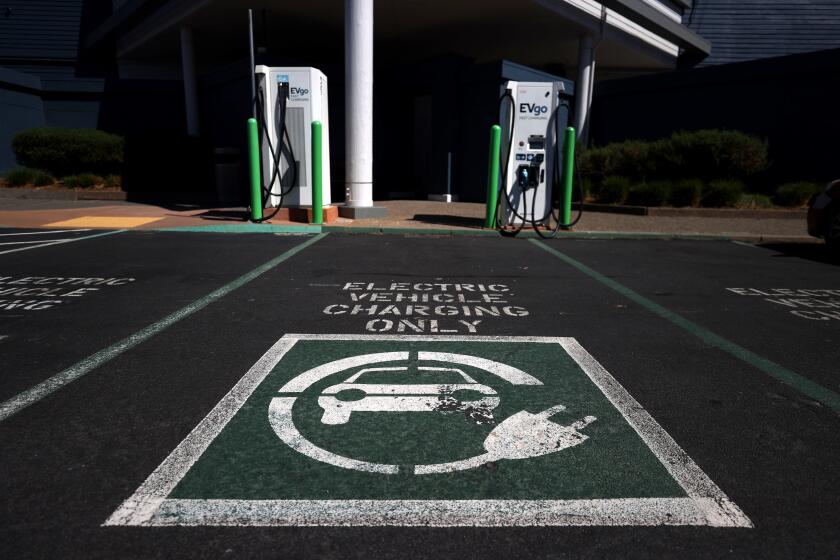U.S. is said to probe GM recall
WASHINGTON — The Justice Department has launched a criminal investigation into whether General Motors purposely held back information about safety defects in some of its cars that were part of a recall last month, according to people familiar with the matter.
The inquiry by federal prosecutors in New York will examine whether the nation’s largest automaker misled the public to believe there were no safety issues, said one of the people who was not authorized to speak publicly.
“Their intent is what is key here,” the person said.
The criminal probe is the latest scrutiny over a safety defect that led to 13 deaths linked to faulty ignition switches in the automaker’s Chevrolet Cobalt sedan and other cars.
Congress this week launched its own investigation into the long-delayed recalls.
The bipartisan House Energy and Commerce Committee on Tuesday sent the letters to the automaker and the National Highway Traffic Safety Administration seeking “documents detailing the problems and related consumer complaints.”
“There are several questions surrounding this latest recall, and right now we are just looking for answers to determine what the company and NHTSA knew about these problems, when they knew it, and what they did about it,” committee Chairman Fred Upton (R-Mich.) said Tuesday.
On Monday, the same committee announced it would “examine whether GM knowingly allowed faulty and dangerous cars to remain on the road,” said Rep. Henry Waxman (D-Beverly Hills), the committee’s ranking Democrat. “We will be assessing whether NHTSA has all the tools the agency needs to keep drivers safe.”
The news pushed GM’s stock price down more than 5.15%, to $35.18, on Tuesday.
The global recall of 1.6 million GM cars in February stems from an issue with the ignition switch. On certain models, a heavy key chain or the driver’s knee can knock the key from the “run” position to the “accessory” position — cutting the engine’s power and disabling safety systems such as anti-lock brakes, power steering and air bags.
The issue has been linked to at least 13 deaths and 31 crashes in the U.S. since 2004. According to documents submitted to NHTSA by GM, the automaker knew about the problem as early as 2004 and issued a service bulletin alerting its dealers in 2005. At the time, the automaker recommended that customers remove extra keys or other items from their key chains.
In the U.S., a total of 1.4 million cars were affected: 2003-2007 Saturn Ions, 2006-2007 Chevrolet HHRs, 2006-2007 Pontiac Soltices, 2006-2007 Saturn Sky models, and 2005-2007 Chevrolet Cobalt and Pontiac G5 models.
GM would not comment.
The investigations only heightened consumer advocates’ appeals for more transparency and resources at the NHTSA, along with stiffer penalties for automakers that are slow to address safety issues.
“This is a very big deal,” said Joan Claybrook, former head of the NHTSA and president emeritus of Public Citizen, a nonprofit consumer advocacy group. The investigation is only the fourth time since 1978 that Congress has called an automotive company to testify regarding an open recall, Claybrook said.
Both GM and NHTSA should have acted sooner to fix the affected cars, Claybrook said.
“In many ways, this is as bad as I’ve seen,” she said. “Both the NHTSA and GM had information on exactly what the problem was in 2007, and that should have been enough for them to take action.”
Records show that the safety agency met with GM in 2007 to discuss the issue, but neither took action. It wasn’t until Feb. 13 of this year that GM issued its first recall related to the ignition problem. On Feb. 25, the automaker issued a second recall, along with a rare apology.
“We are deeply sorry,” Alan Batey, GM’s North America president, said in a statement.
On Monday, GM said it would cooperate with investigations by NHTSA and Congress.
“We welcome the opportunity to help both parties have a full understanding of the facts,” the company said in a statement.
As part of the probe, the committee will hold a hearing in the coming weeks to determine if GM delayed its recall, Upton said. The committee also will look into whether safety regulators were slow to respond, despite consumer complaints.
Upton sponsored legislation, enacted in 2000, that was designed to get automakers and regulators to move quickly to recall vehicles and parts with safety defects.
If the NHTSA determines that GM failed to notify the agency of the defect promptly, the automaker could be hit with a $35-million fine.
But that threat represents a small penalty to a company of GM’s size, and serves as little deterrent for automakers that bend the rules, said Clarence Ditlow, executive director of the Center for Auto Safety.
“$35 million is peanuts to GM or Toyota,” Ditlow said. “Congress has got to increase those fines.”
Congress also needs to give the agency a bigger budget and a larger staff to effectively police the industry.
“NHTSA just doesn’t have the weapons it needs to take on trillion-dollar corporations,” Ditlow said. “The American public shouldn’t have to pay with their lives for failure in the recall system.”
david.undercoffler@latimes.com









